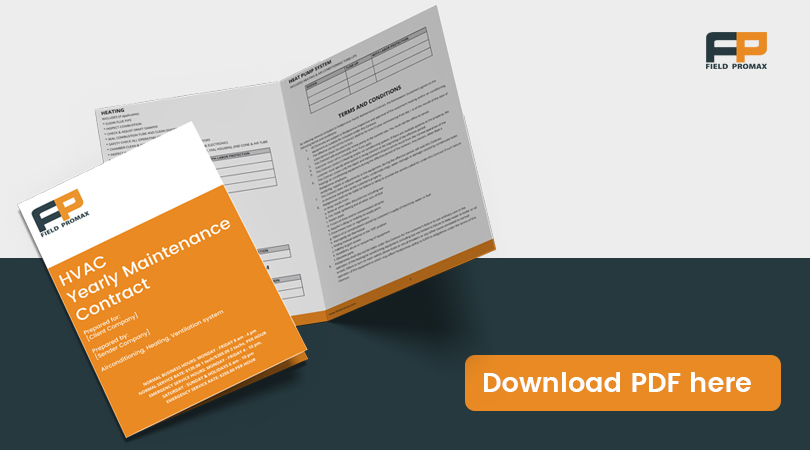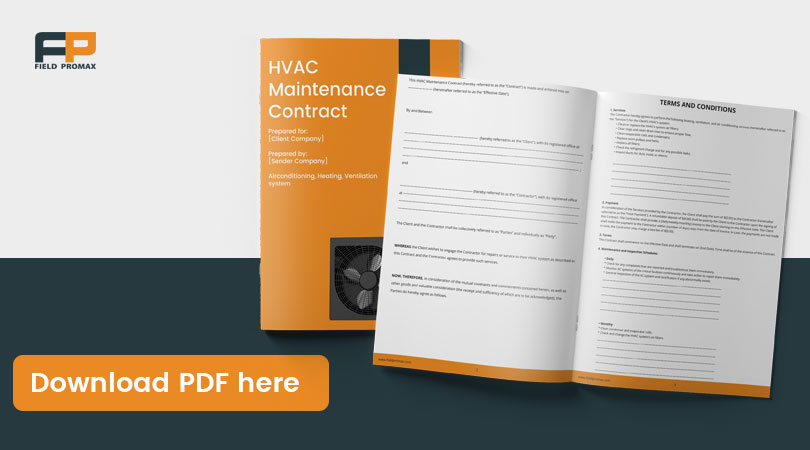If you own an HVAC business, you know how much of a burden paperwork can be! But you cannot avoid them. So, how do you manage?
An HVAC business involves lots of legal documents. From registering the business to filing for taxes, there are hundreds and thousands of pieces of paperwork that you need to take care of. But there is more to the story. Your day-to-day operations are not free of documentation either. Among them, service contracts management is something that you should learn all about.
Having said that, we know how much you dislike handling documents and doing paperwork. As a tradesperson, you are better off with your tools. You prefer to spend your time fixing something. We totally get that! And also appreciate that. But a management service contract is something you cannot escape, not if you want to run your business legally and efficiently.
To help you with the task, we have put together all the important information you need to know about HVAC service contracts. In this blog, you’ll learn what an HVAC contract is, why it is important, how to write an HVAC contract, and what to avoid in such a legal document. We have also included some easy, efficient HVAC service contract templates for you. Start today, and you’ll be able to create your own contracts in no time!
What is an HVAC Service Contract?
In simple words, an HVAC service contract is a legal document that creates a binding commitment and agreement between the customer and HVAC technicians. If you want a more technical HVAC service contract definition, consider it a document that specifically states the service, products, parts, supplies, number of visits, and emergency service the service provider will cover and the price that the customer will pay for the said services. It is the complete service plan for an HVAC system that guarantees routine maintenance and repair.
Most service contracts for HVAC are annual and charged on a yearly or monthly basis. This ensures that the system is monitored and cared for year-round. There are three types of service contracts in general:
- Full-service packages that include repairs, maintenance, and parts for one single annual fee.
- Work-only contracts with a yearly fee that includes the technician’s time. Anything else, like tools or things you use up, is an extra cost.
- Preventive maintenance and inspection contracts include scheduled check-ups, either once a season or once a year, with extra repairs or maintenance charged separately and at a discount.

How to Write an HVAC Service Contract
There are a few things that you should be mindful of when writing an HVAC service provider contract. We will point them out shortly. But more importantly, there is a specific technique that you should be aware of when writing service management contracts, because they are legal documents after all!
No need to worry, though! Just follow these six simple steps, and you will have your own professional, flawless service contracts for HVAC.
1. Clarify the Basics
When it comes to business maintenance, services usually include general upkeep, repair and troubleshooting, facility maintenance, and sometimes even the installation of private or commercial buildings and the equipment in them (electrical systems, heating, cooling, plumbing, etc.). This depends on what you have agreed to or negotiated with the client.
2. Identify the Parties Involved
For more than just obvious reasons, the contract should start by saying whether each party is a person or a company. It should then list other information that identifies them legally.
3. State the Services Promised
Write down the maintenance services you decided to do or promised to do. Here is where you should get specific and list as many of the services as you can. In an HVAC service providers contract, you should spell out the limits of the work as well as any other parts or troubleshooting you may be doing. If not, any service that isn’t clear wouldn’t make the deal binding.
4. Include Warranties
Write up a section for any service warranties or promises made by one or both parties. Warranties can be as simple as a promise that both parties will follow all laws while the contract is in effect or while doing business together, or they can be as complicated as refunds and money-back guarantees for equipment used and time spent on a task that the other party isn’t happy with.
5. Chalk Out Guidelines for Dispute
No matter how well-thought-out, well-written, and well-intentioned they are, there are times when one party will dispute a phrase or part of the contract because they think it wasn’t clear enough or because they think something is broken. If you don’t want to drag both of your companies into a court fight, add indemnity clauses that say how you will work together.
6. Set Payment Terms
The maintenance service agreement for your business should indicate the most accurate price. It should also be clear if you’ll be paid in a lump sum, by the hour, by the week, or by the month. If you plan to charge all or most of your clients about the same amount for the same service, put the numbers in the contract. If not, there should be blanks that you can fill in based on what you agree to with each client.
If you still find service contract management difficult, feel free to use these templates:









